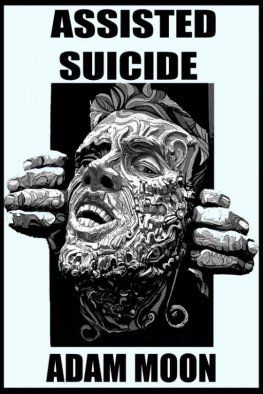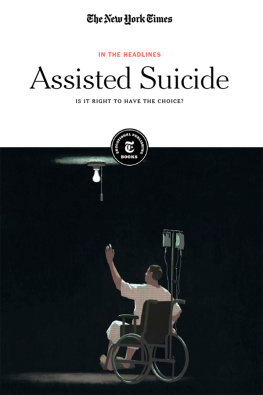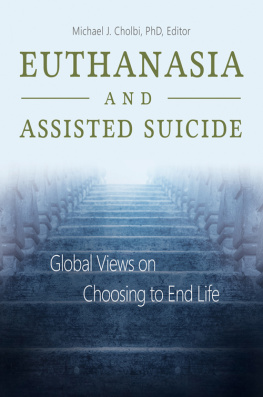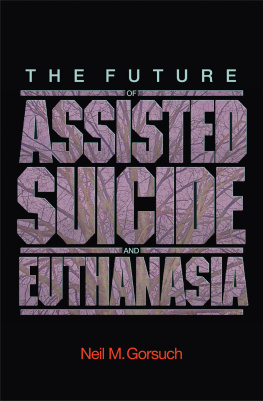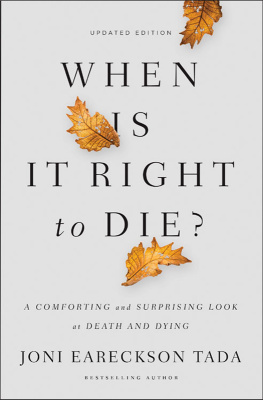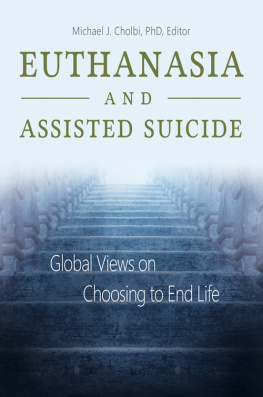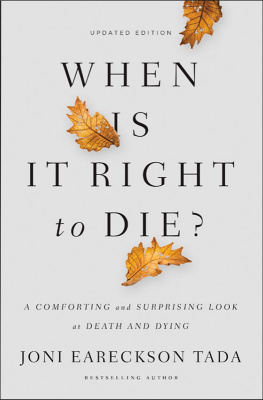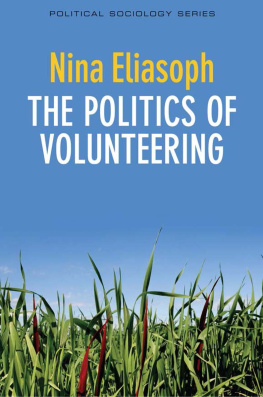First published by Garland Publishing, Inc.
This edition published 2011 by Routledge:
Routledge
Taylor & Francis Group
711 Third Avenue
New York, NY 10017 | Routledge
Taylor & Francis Group
2 Park Square, Milton Park
Abingdon, Oxon OX14 4RN |
Copyright 1997 Nina Clark
All rights reserved
Library of Congress Cataloging-in-Publication Data
Clark, Nina, 1966
The politics of physician assisted suicide / Nina Clark.
p. cm. (Garland studies on the elderly in America)
Includes bibliographical references and index.
ISBN 0-8153-2645-9 (alk. paper)
1. Assisted suicideGovernment policyUnited States. 2. Assisted suicideLaw and legislationUnited States. 3. Assisted suicideUnited StatesPublic opinion I. Title. II. Series.
R726.C553 1997
179.7dc21 |
96-48392 |
The winds of change are blowing across the deathbeds of America. By the turn of the century, after twenty-five years of hot debatesometimes compassionate and intelligent, often dogmatic and bitterwe shall be in a new era of death by choice for those who would rather not suffer unbearably when they are assuredly dying.
The circumstances and events which have brought about this seminal change from two thousand years of Judeo-Christian tradition that suicide of any kind was a mortal sin were mainly the following:
The introduction of high-technology medicine (including sophisticated drugs) which often defeated the specter of death but reduced quality of life.
A better educated and informed public now capable (through the expanded news media not available to our grandparents) of making up its own mind on issues of medical decisions and ethics.
The rise from 1980 onwards of a militant right-to-die movement campaigning consistently, and with high visibility, for change in attitudes and laws relating to justifiable assisted death.
The publicity-driven, maverick campaign commencing in 1990 of Dr. Jack Kevorkian to destroy the official myth that doctors must never kill no matter how much their patients are suffering.
The publication and rise to the bestseller lists in 1991 of Final Exit, making easily available to the public a manual by which terminally ill patients couldwith or without a doctor's aidtake their own lives if they wished.
Voters' ballot initiatives in three West Coast states asking for lawful physician-assisted dying, the last of which (Oregon, 1994) was successful.
Landmark rulings by both the 9th and 2nd Circuit Courts of Appeal (1996) which agreed that existing states' laws prohibiting physician-assisted suicide were unconstitutional. Whether or not these rulings are eventually overturned, the impact of arguments cogently made by some twenty-seven high court judges remain historic.
In the 1980s the arguments concerning hastened death revolved around whether or not the procedure was ethical. In the next decade, with public opinion moving as high as 70 percent in favor, the arguments switched to whether or not it could be successfully regulated by law or better left to the medical profession to self-regulate.
Yet anther debate broke out over whether the courts could or should not only approve acceptance but also sanction the criteria for physician-assisted suicide. Could a small group of non-elected jurists fix a nation's social and ethical policy? Sometimes in the American democratic system, the issues are so divisiveabortion and gay rights are the best modern examplesthat the high courts have no choice but to step in and adjudicate. The right to die' is the latest hot topic to be dropped into the laps of the nation's senior judges.
The religious right has never forgiven the U.S. Supreme Court for its 1973 decision in Roe v. Wade to allow a woman the right to have a legal abortion. So successfiil have they been in keeping their dissent alive that a visitor to America listening to the news on the radio or television could be forgiven for concluding that abortion was still illegal here!
It is virtually certain that the right to die movement will have to spend the next twenty years defending the modest gains it has made so far. Successful ballot initiatives like Oregon's Measure 16 will be opposed in the courts with claims of unconstitutionality, attacked in legislatures and either overturned or neutered, or negated by counter initiatives specifically criminalizing assisted suicide.
Social progress never comes easily in a democracy, especially one so wonderfully open and argumentative as America's. That is why Nina Clark's book is a pithy and valuable record of the political battles so far over voluntary, medically-hastened death. As Winston Churchill commented, unless we learn from history we are destined to repeat its mistakes.
Derek Humphry
Oregon, September, 1996
About half way through writing what was originally my doctoral dissertation, I recognized the hidden agenda which compelled me to choose physician aid-in-dying as the topic I would research for three years: the inevitability of death frightened me and studying it offered a way to reconcile the dying process.
In my post-manuscript moments, however, I would be remiss to assert that I am without fear and at peace with the fact that death remains a reality for all of us. Both of my maternal grandparents passed away during the time that this project was under waymy grandmother just as I was beginning, and my grandfather as I was finishing. Even though I had thoroughly saturated myself with death and dying issues and believed that in the process I had fought a sufficient battle with mortality, I found these losses difficult. Thus, in spite of and perhaps because of my discomfort with death I continue to strongly believe that we should be able to at least control the time and manner in which it occurs.
As I worked on this manuscript, numerous people have been helpful at different points. Warmest thanks are due to the members of my dissertation committee: Dr. William W. Lammers, Chair, Dr. Alison Dundes Renteln, and Dr. Phoebe S. Liebig, who were supportive and always challenged me to go one step further. Special thanks to Alison, for help in accessing legal information and for her wonderful mentoring skills.
Additional thanks go to: the Hemlock Society Headquarters in Oregon, especially Ms. Lois Schafer, for many conversations and for being expeditious about supplying me with various written materials; Dr. Gary Johnson, Editor of Politics and the Life Sciences, for helping me to refine ; Mr. Derek Humphry, for guidance through e-mail and for his own inspirational writings; the staff at Garland Publishing, Inc., especially Kristi Long, for help in pulling this manuscript together; the members of the Pasadena Senior Center for participating in the survey used in this study; and finally, my many friends and colleagues who were so encouraging throughout this whole process.
My mother and special friend, Roma Turoff, in offering much reassurance, was fond of telling me that if it were that easy, we'd all do it. In many respects, she has traveled this journey with me, clipping articles and passing along other pertinent, miscellaneous information, keeping abreast of new developments within the movement, and enthusiastically engaging in verbal discourse. Everyone needs a cheerleader for endeavors such as this one. Fortunately for me, she was mine.


